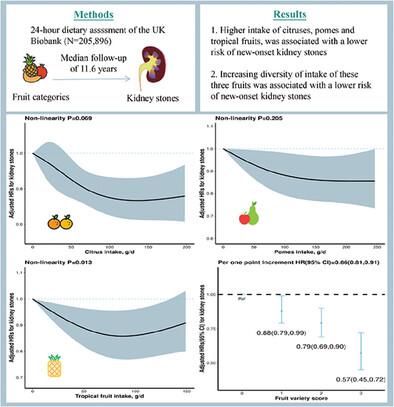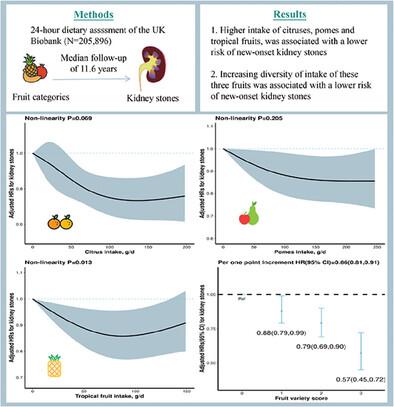Association of Quantity and Diversity of Different Types of Fruit Intake with New-Onset Kidney Stones
Abstract
Scope
This study aims to assess the association between intake of different types of fruit (citrus, pomes, tropical fruits, berries, gourds, drupes, dried fruits, and other fruits), the intake diversity of fruit types, and risk of new-onset kidney stones in general population.
Methods and results
A total of 205 896 participants with at least one completed 24-h dietary recall from the UK Biobank are included. During a median follow-up of 11.6 years, 2074 cases of kidney stones are documented. Compared with nonconsumers, participants with higher intake of citrus (50–<100 g day−1; hazards ratio [HR] = 0.78; 95% confidence interval [CI], 0.66–0.91; ≥100 g day−1; HR = 0.75; 95%CI, 0.63–0.89), pomes (≥100 g day−1; HR = 0.86; 95%CI, 0.77–0.96), or tropical fruits (50–<100 g day−1; HR = 0.86; 95%CI, 0.75–0.99; ≥100 g day−1; HR = 0.88; 95%CI, 0.79–0.99) have a lower risk of new-onset kidney stones. However, there is no significant association of intake of berries, gourds, drupes, dried fruits, and other fruits with kidney stones. A higher fruit variety score is significantly associated with a lower risk of new-onset kidney stones (per 1-score increment, HR = 0.86; 95%CI, 0.81–0.91).
Conclusions
Higher intake of citruses (≥50 g day−1), pomes (≥100 g day−1), and tropical fruits (≥50 g day−1), as well as increasing diversity of intake of these three fruits, are associated with a lower risk of new-onset kidney stones.



 求助内容:
求助内容: 应助结果提醒方式:
应助结果提醒方式:


